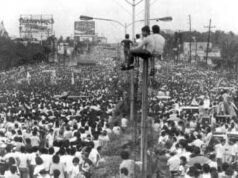CLARK FREEPORT – Leaders of multi-sectoral groups, including that of overseas Filipino workers (OFW’s) in Central Luzon, expressed yesterday “full support” to Pres. Aquino’s plan to finally adopt open skies policy which they want to be total, not just partial, for the benefit of OFW’s and to boost local tourism.
“It’s a long-delayed justice for the hundreds of thousands of OFW’s who would benefit from cheaper and direct flights from the places they work abroad. It is also an act dismantling virtual aviation monopoly that has shackled national interest for so long,” said Ruperto Cruz, chairman of the Pinoy Gumising Ka Movement (PGKM).
His group had pushed for open skies policy at the Diosdado Macapagal International Airport (DMIA) way back when former Pres. Ramos issued in 1994 an executive order declaring the Diosdado Macapagal International Airport (DMIA) here as “the future site of the country’s premiere international airport.”
“It is unfortunate that air access to the Philippines is not only inadequate. It is severely limited by an antiquated regulatory policy that seeks to preserve certain advantages for a select few at the expense of those who need to fly,” Cruz said.
The foreign workers recruitment industry, represented by the Federated Association of Manpower Exporters (FAME) and its ally, the Center for Strategic Initiatives also expressed support for more liberalized open skies policy. They complained of shortage of flights to the Middle East, thus resulting in delays in deployment of workers for as long as a month or more.
Officials of the Clark International Airport Corp. (CIAC) which operates the DMIA here also issued yesterday a statement saying “we are one hundred percent behind Pres. Aquino’s call to re-examine national air policies, including its further liberalization to promote growth of domestic and foreign travelers into the country.”
CIAC Executive Vice President Alex Cauguiran noted that partial open skies are already in effect at the DMIA through Executive Order 219 issued in 1995 and EO 500-A issued in 2006.
This, he noted, increased tourist arrivals through the DMIA to increase from a mere 50,000 in 2004 to 600,000 last year.
Pres. Aquino earlier said the government is studying the implementation of the open skies policy, which will allow more flights to enter the country and abolish the pre-set flight limit currently imposed.
“Having a total open skies policy or a partial open skies policy which was done somewhere in the late 1990s is already being studied,” Aquino said. He cited the case of Indonesia where tourist arrival ballooned to three million from just 30,000 visitors as a result of open skies policy.
In the Philippines, tourist arrival has reached three million and the government is projecting to double the figure in two years.
This, even as the Affordable Air Access Alliance-OFW Sector (4A’s), an alliance of overseas Filipino workers (OFW), headed by Arnel de Guzman, also backed Aquino’s plan for total open skies policy which “would allow millions of Filipino workers in the Middle East cheaper access to air fares being granted by various air carriers”.
During the past administration, the same group accused Pres. Arroyo of being beholden to political patrons in the local aviation industry that prevented her from adopting a more liberal open skies policy to benefit OFW’s in the Middle East and other foreign lands worldwide.
“There are about 1.8 million overseas Filipino workers mostly coming from Central and Northern Luzon. The closest airport in the area is DMIA in the Clark Freeport,” De Guzman said.
The Clark Investors and Locators Association (CILA) noted that EO 500-A restricted foreign airlines at DMIA to only the third and fourth international freedom rights of air carriers and thus “effectively reduce the number of potential flights and passengers to the DMIA and dampening its attractiveness as a regional hub”.
This, it said, is aggravated by the EO’s limiting access to DMIA only to airlines officially designated as carriers by their host countries.
The so-called third freedom grants a foreign airline the privilege to fly passengers from its host country to the DMIA, while the fourth freedom grants the airline to fly passengers from the DMIA to the host country.
The existing EO 500-A does not permit other such internationally recognized freedoms, including one that grants foreign airlines to pick up passengers from the DMIA and fly to a third country.
Because of this, various groups here crafted during the Arroyo administration their proposed EO 500-B which allows all international freedom rights to foreign airlines, except cabotage or domestic flights within the Philippines. This, however, was ignored by the former president.
Earlier, the Federated Association of Manpower Exporters (FAME) and its ally, the Center for Strategic Initiatives, headed by Rene Diaz, former presidential assistant for Northern Luzon, also expressed support for more liberalized open skies policy.
Diaz challenged the Philippine Airlines (PAL) to give up its entitlements in the Middle East market so that additional flights can be mounted by other Middles East carriers to service the needs of the 3 million OFWs in that region.
The recruitment industry reported that 30,000 contract workers are stranded for several weeks before they could leave for their jobsites in the Middle East arising from shortage of flights.
The recruitment industry has complained that thousands of OFWs are finding difficulty in booking flights to the Middle East as the lack of airline seats and carriers to destinations manifested itself in a repeat scenario of the 2007-2008 Christmas season.
Jackson Gan, FAME vice-president, said it takes a minimum of one month to book their departing OFWs for their job sites.
“This delay results in losses for the recruitment agency and the worker who is anxious to earn his salary immediately. Most these workers have been looking for jobs for the past few months and some had resigned as early as two months before they were selected by the agency,” he said.
He noted that some Middle East air carriers operating budget airlines have expressed their desire to fly into the Philippines via the Clark or Subic international airports.
The recruitment sector has batted for increased frequencies of Middle East airlines Emirates, Gulf Air, Etihad, and Qatar Airways.
“It’s a long-delayed justice for the hundreds of thousands of OFW’s who would benefit from cheaper and direct flights from the places they work abroad. It is also an act dismantling virtual aviation monopoly that has shackled national interest for so long,” said Ruperto Cruz, chairman of the Pinoy Gumising Ka Movement (PGKM).
His group had pushed for open skies policy at the Diosdado Macapagal International Airport (DMIA) way back when former Pres. Ramos issued in 1994 an executive order declaring the Diosdado Macapagal International Airport (DMIA) here as “the future site of the country’s premiere international airport.”
“It is unfortunate that air access to the Philippines is not only inadequate. It is severely limited by an antiquated regulatory policy that seeks to preserve certain advantages for a select few at the expense of those who need to fly,” Cruz said.
The foreign workers recruitment industry, represented by the Federated Association of Manpower Exporters (FAME) and its ally, the Center for Strategic Initiatives also expressed support for more liberalized open skies policy. They complained of shortage of flights to the Middle East, thus resulting in delays in deployment of workers for as long as a month or more.
Officials of the Clark International Airport Corp. (CIAC) which operates the DMIA here also issued yesterday a statement saying “we are one hundred percent behind Pres. Aquino’s call to re-examine national air policies, including its further liberalization to promote growth of domestic and foreign travelers into the country.”
CIAC Executive Vice President Alex Cauguiran noted that partial open skies are already in effect at the DMIA through Executive Order 219 issued in 1995 and EO 500-A issued in 2006.
This, he noted, increased tourist arrivals through the DMIA to increase from a mere 50,000 in 2004 to 600,000 last year.
Pres. Aquino earlier said the government is studying the implementation of the open skies policy, which will allow more flights to enter the country and abolish the pre-set flight limit currently imposed.
“Having a total open skies policy or a partial open skies policy which was done somewhere in the late 1990s is already being studied,” Aquino said. He cited the case of Indonesia where tourist arrival ballooned to three million from just 30,000 visitors as a result of open skies policy.
In the Philippines, tourist arrival has reached three million and the government is projecting to double the figure in two years.
This, even as the Affordable Air Access Alliance-OFW Sector (4A’s), an alliance of overseas Filipino workers (OFW), headed by Arnel de Guzman, also backed Aquino’s plan for total open skies policy which “would allow millions of Filipino workers in the Middle East cheaper access to air fares being granted by various air carriers”.
During the past administration, the same group accused Pres. Arroyo of being beholden to political patrons in the local aviation industry that prevented her from adopting a more liberal open skies policy to benefit OFW’s in the Middle East and other foreign lands worldwide.
“There are about 1.8 million overseas Filipino workers mostly coming from Central and Northern Luzon. The closest airport in the area is DMIA in the Clark Freeport,” De Guzman said.
The Clark Investors and Locators Association (CILA) noted that EO 500-A restricted foreign airlines at DMIA to only the third and fourth international freedom rights of air carriers and thus “effectively reduce the number of potential flights and passengers to the DMIA and dampening its attractiveness as a regional hub”.
This, it said, is aggravated by the EO’s limiting access to DMIA only to airlines officially designated as carriers by their host countries.
The so-called third freedom grants a foreign airline the privilege to fly passengers from its host country to the DMIA, while the fourth freedom grants the airline to fly passengers from the DMIA to the host country.
The existing EO 500-A does not permit other such internationally recognized freedoms, including one that grants foreign airlines to pick up passengers from the DMIA and fly to a third country.
Because of this, various groups here crafted during the Arroyo administration their proposed EO 500-B which allows all international freedom rights to foreign airlines, except cabotage or domestic flights within the Philippines. This, however, was ignored by the former president.
Earlier, the Federated Association of Manpower Exporters (FAME) and its ally, the Center for Strategic Initiatives, headed by Rene Diaz, former presidential assistant for Northern Luzon, also expressed support for more liberalized open skies policy.
Diaz challenged the Philippine Airlines (PAL) to give up its entitlements in the Middle East market so that additional flights can be mounted by other Middles East carriers to service the needs of the 3 million OFWs in that region.
The recruitment industry reported that 30,000 contract workers are stranded for several weeks before they could leave for their jobsites in the Middle East arising from shortage of flights.
The recruitment industry has complained that thousands of OFWs are finding difficulty in booking flights to the Middle East as the lack of airline seats and carriers to destinations manifested itself in a repeat scenario of the 2007-2008 Christmas season.
Jackson Gan, FAME vice-president, said it takes a minimum of one month to book their departing OFWs for their job sites.
“This delay results in losses for the recruitment agency and the worker who is anxious to earn his salary immediately. Most these workers have been looking for jobs for the past few months and some had resigned as early as two months before they were selected by the agency,” he said.
He noted that some Middle East air carriers operating budget airlines have expressed their desire to fly into the Philippines via the Clark or Subic international airports.
The recruitment sector has batted for increased frequencies of Middle East airlines Emirates, Gulf Air, Etihad, and Qatar Airways.




